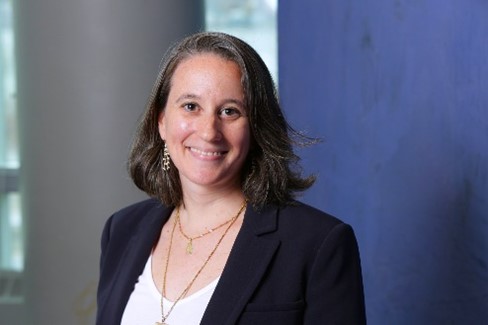Friday, November 19 | 2:00 p.m. – 4:00 p.m. | Special Session
Providing Care for the Unvaccinated: Psychological Approaches to Address Anger and Frustration
Sponsored by APA and ABCT

Brad J. Bushman, Professor of Communication and Psychology, The Ohio State University
Deborah R. Glasofer, Ph.D., Associate Professor of Clinical Medical Psychology (in Psychiatry) at the Columbia University Irving Medical Center (CUIMC), linical psychologist at the Columbia Center for Eating Disorders at the New York State Psychiatric Institute
J. Kim Penberthy, Ph.D., ABPP, Chester F. Carlson Professor of Psychiatry and Neurobehavioral Sciences, University of Virginia School of Medicine



About the Presenters:
Brad J. Bushman is a Professor of Communication and Psychology at The Ohio State University. For over 30 years he has studied aggression and violence. He was a member of President Obama’s committee on gun violence and has testified before the U.S. Congress on youth violence. In 2014 he received the Distinguished Lifetime Contribution to Media Psychology and Technology from the American Psychological Association, and in 2017 he received the Kurt Lewin Award from the Society for the Psychological Study of Social Issues for “outstanding contributions to the development and integration of psychological research and social action” (with Craig Anderson).
Deborah R. Glasofer, Ph.D., is an Associate Professor of Clinical Medical Psychology (in Psychiatry) at the Columbia University Irving Medical Center (CUIMC) and clinical psychologist at the Columbia Center for Eating Disorders at the New York State Psychiatric Institute. She is a team member of CopeColumbia, a group of psychiatrists and psychologists within CUIMC’s Department of Psychiatry providing peer support, information, and resources for managing stress, fear, anger, and anxiety during the COVID-19 pandemic. Dr. Glasofer has written for Scientific American Mind, Psychology Today, The Huffington Post, Verywell, and The Feed, and authored several books on eating disorders for clinicians, academics, and the general public.
J. Kim Penberthy, Ph.D., ABPP is the Chester F. Carlson Professor of Psychiatry and Neurobehavioral Sciences at the University of Virginia School of Medicine, where she conducts research, teaches, and provides clinical care. She is Associate Director of Clinician Wellness, Co-Director of Effective Coping & Communication for Clinicians CME Program, and a founding member of the Wisdom & Wellbeing Program to mentor physicians and health care workers at UVA and nationally. She sits on the UVA Diversity Consortium and past chair of APA SPC/Division 12 Diversity Committee. She is past chair of the APA CEC committee and a current Council Representative to the American Psychological Association from the Society of Clinical Psychology. She has published extensively and lectures internationally about psychotherapy, clinician wellness, and contemplative-based interventions. Her most recent book, co-authored with her daughter Morgan, is “Living Mindfully Across the Lifespan: An Intergenerational Guide” (Routledge/Taylor & Francis, 2021).
Categories: Anger, Professional/ Interprofessional Issues, Treatment – CBT
Keywords: Anger / Irritability, Coping, Stress
Basic to moderate level of familiarity
Participants earn 2 continuing education credits
Healthcare workers are increasingly facing stressors in their environments that they may be ill-equipped to handle. Such ongoing stress can negatively impact mood states and functioning, increasing frustration and anger in providers. In this Master Clinician series, we discuss the unprecedented stressors impacting healthcare workers and the negative impact of chronic stress from the ongoing pandemic, including providing care for the unvaccinated. We will present the stress continuum concept including the five human needs in times of stress. This continuum provides a way to conceptualize stress behaviors and describe the additional roles of bias, discrimination, and other system/ environmental issues in stress vulnerability. We will then describe and demonstrate specific effective strategies to help promote resilience and wellbeing that grow out of these needs, including anger management skills and how to use these with teams and in the workplace. Finally, we present examples of successful application of techniques, including results of implementation and lessons learned in healthcare institutions.
At the end of this session, the learner will be able to:
- Describe the stress continuum, impact of chronic stress, types of stressors, and the five human needs in times of stress and effective strategies to address these needs.
- Describe and demonstrate specific effective strategies that grow out of addressing these needs that help promote resilience and reduce frustration and anger.
- Discuss examples of successful application of techniques, including results of implementation and lessons learned in other institutions and health systems.
Outline:
Dr. Penberthy:
- Introduction to the current state of stress in healthcare, including information about levels of stress pre an post COVID and the impacts of such.
- Check-in with participants on their current level of stress
- Present and discuss the stress continuum and its background and application, including the concept of 5 human needs during times of stress.
- Present and discuss strategies for addressing these 5 human needs, with some practice of 4-square breathing, etc.
Dr. Bushman:
- Present and discuss the scientific research that debunks ineffective strategies for managing angry feelings.
- Present and discuss the scientific research that supports effective strategies for managing angry feelings.
Dr. Glasofer
- Present and discuss additional strategies for addressing the needs of healthcare teams and institutions along with examples of implementation.
- Describe themes encountered at different stages of the ongoing pandemic.
- Discuss how to apply evidence-based psychotherapeutic interventions in a peer-support. model, highlighting how cognitive strategies and professional values clarification can be applied to the unique stressors associated with being a healthcare worker during COVID-19.
- Invite participant reflection on strategies they used (1) to cope with unhelpful thoughts during the pandemic and (2) to maintain connection to their professional values.
Long-term Goals:
Describe and disseminate knowledge about the stress continuum and the impact of stressors on mood and behavior in yourself, others, the workplace, and teams.
Describe, implement, and disseminate effective strategies for addressing stress and stress behaviors, specifically focusing on addressing the five human needs during times of stress and reducing frustration and anger.
Recommended Readings:
Mischkowski, D., Kross, E., & Bushman, B. J. (2012). Flies on the wall are less aggressive: Self-distanced reflection reduces angry feelings, aggressive thoughts, and aggressive behaviors. Journal of Experimental Social Psychology, 48(5), 1187-1191. DOI: 10.1016/j.jesp.2012.03.012
Penberthy, J. K., Chhabra, D., Ducar, D. M., Avitabile, N., Lynch, M., Khanna, S., … & Schorling, J. (2018). Impact of coping and communication skills program on physician burnout, quality of life, and emotional flooding. Safety and health at work, 9(4), 381-387
Mellins, C.A., Mayer, L.E.S., Glasofer, D.R., Devlin, M.J., Albano, A.M., Nash, S.S., Engle, B., Cullen, C., Ng, W.Y.K., Allman, A., Fitelson, E.M., Vieira, A., Baptista-Neto, L. (2020) Supporting the well-being of health care providers during the COVID-19 pandemic: The CopeColumbia response. General Hospital Psychiatry, 67, 62-69.
